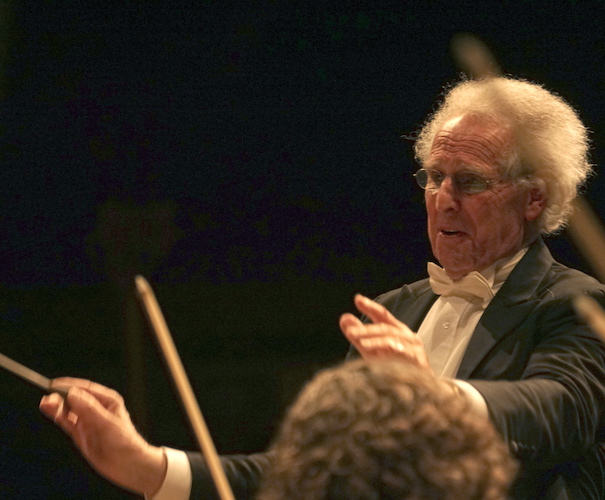Concert Review: Russian Music by the Boston Philharmonic
Benjamin Zander, who’s led some distinctly fine concerts in recent years, drew the best out of his band.

Benjamin Zander conducting the Boston Philharmonic Orchestra at Sanders Theater. Photo: courtesy of the artist.
By Jonathan Blumhofer
It takes a certain amount of chutzpah to program Prokofiev’s Piano Concerto no. 3 just four months after Martha Argerich played the daylights out of it at Symphony Hall during an October tour. But that’s just what the Boston Philharmonic Orchestra (BPO) did this past weekend, placing Prokofiev’s popular score as the centerpiece of an all-Russian program, between works by Mussorgsky and Tchaikovsky.
Was the risk well taken? Well, let’s just say that, when you’ve got a pianist like Alexander Korsantia in the house, you’re in good hands. Sunday’s closing performance of the run might not quite have topped Argerich’s for interpretative command (though I’m sure some in the afternoon’s audience would like to debate that), but it often matched hers for sheer electricity and excitement.
The Tbilisi-born Korsantia is a discovery. Though not a particularly big guy on the stage, he’s a powerful player, at some points on Sunday calling to mind Yefim Bronfman and his habit of miraculously thundering through an orchestra playing fortissimo without ever making the keyboard sound shrill.
At the same time, he’s got a marvelously light touch. The delicate runs in the Prokofiev’s first two movements were executed with terrific precision and nicely colored. The solo part’s inner voices were shaped with care and Korsantia’s command of the music’s architecture was never in question.
In fact, for all the spectacular passagework and the manic energy found in Korsantia’s playing, the most impressive feat of Sunday’s Prokofiev was possibly the pianist’s expositional command of the music. It tended towards the lyrical – the big middle section of the finale, for instance, sang with tender warmth, as did his Schubert encore – but had lots of personality to boot. That came across with ample clarity in the involved second-movement variations, which alternated sparkling wit and glowering sobriety in equal measure.
It helped, too, that Benjamin Zander and the BPO were in such fine form, smartly drawing out the orchestral part’s array of colors (the string col legno bowings, Prokofiev’s inimitable woodwind writing, etc.) and nailing its whorling rhythms. Even the trickiest ensemble bits – like the violins and piano playing knuckle-busting unison runs – held no terrors for the orchestra; their playing was consistently spot-on.
Zander and the orchestra prefaced the Prokofiev with Nikolai Rimsky-Korsakov’s orchestration of Mussorgsky’s Khovanshchina Prelude. It’s a short piece, just about five minutes long, but its dreamy textures made it a perfect lead-in to the Piano Concerto, which crafts its own beguiling opening statement.
The BPO did Rimsky’s orchestration proud, especially over Khovanshchina’s first half, in which the delicate dovetailing effects between strings and winds really popped. Indeed, the woodwind playing was particularly fine throughout the Prelude, highlighted by principal oboe Amanda Hardy’s solo.
After intermission, Zander and the BPO turned their attention to Tchaikovsky’s Symphony no. 4. This may be one of the repertoire’s familiar pillars, but there was nothing mundane about Zander’s interpretation on Sunday. His was, on the whole, a fast take on the piece and, perhaps partly as a result, a rather unsentimental one. That was good. What you got, instead of overheated emotionalism, was a completely fresh reading of an old warhorse.
The Symphony’s quirks – the opening movement’s unpredictable rhythmic profile, the finale’s sudden turn to a folk-like idiom, and so on – stood out. So did its flawless orchestration. And one could easily trace the music’s connecting motives, like the first-movement’s little chromatic fillips that come to dominate the finale’s closing pages, as they unfolded.
Throughout, the score’s intensity burned white-hot: the outer movement climaxes were furiously driven but never out of control. The slow movement built in passionate waves. The scherzo, if a mite slow, still brimmed with charm.
Zander, who’s led some distinctly fine concerts in recent years, drew the best out from his band. The brass playing, particularly by the horns, was world-class. In the slow movement, oboist Hardy and principal bassoon Ronald Haroutunian turned in lovely accounts of their respective solos. And the strings, whether articulating the hesitant, mysterious waltzes of the first movement or the strict pizzicato passages of the scherzo, played with vigor and tonal heat.
So, in the end, no, it shouldn’t be surprising that the BPO have the nerve to bring back Prokofiev Three so soon. They’ve earned that right: these days, they’re at the top of their game.
Jonathan Blumhofer is a composer and violist who has been active in the greater Boston area since 2004. His music has received numerous awards and been performed by various ensembles, including the American Composers Orchestra, Kiev Philharmonic, Camerata Chicago, Xanthos Ensemble, and Juventas New Music Group. Since receiving his doctorate from Boston University in 2010, Jon has taught at Clark University, Worcester Polytechnic Institute, and online for the University of Phoenix, in addition to writing music criticism for the Worcester Telegram & Gazette.

